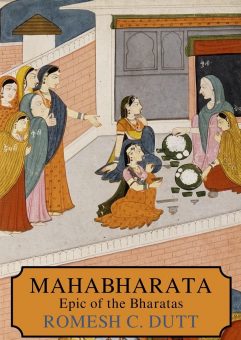“Trust me, husband, if Savitri hath been faithful in her love,
If she hath with pious offerings served the righteous gods above,
If she hath a sister’s kindness unto brother men performed,
If she hath in speech and action unto holy truth conformed,
Unknown blessings, mighty gladness, trust thy ever faithful wife,
And not sorrows or disasters wait this eve our parents’ life!”
Then she rose and tied her tresses, gently helped her lord to rise,
Walked with him the pathless jungle, looked with love into his eyes,
On her neck his clasping left arm sweetly winds in soft embrace,
Round his waist Savitri’s right arm doth as sweetly interlace,
Thus they walked the darksome jungle, silent stars looked from above,
And the hushed and throbbing midnight watched Savitri’s deathless love!
Book VI. Go-Harana (Cattle-Lifting)
[269] The conditions of the banishment of the sons of Pandu were hard. They must pass twelve years in exile, and then they must remain a year in concealment. If they were discovered within this last year, they must go into exile for another twelve years.
Having passed the twelve years of exile in forests, the Pandav brothers disguised themselves and entered into the menial service of Virata, king of the Matsyas, to pass the year of concealment. Yudhishthir presented himself as a Brahman, skilled in dice, and became a courtier of the king. Bhima entered the king’s service as cook. For Arjun, who was so well known, a stricter concealment was necessary. He wore conch bangles and earrings and braided his hair, like those unfortunate beings whom nature has debarred from the privileges of men and women, and he lived in the inner apartments of the king. He assumed the name of Brihannala, and taught the inmates of the royal household in music and dancing. Nakula became a keeper of the king’s horses, and Sahadeva took charge of the king’s cows. Draupadi too disguised herself as a waiting-woman, and served the princess of the Matsya house in that humble capacity.
In these disguises the Pandav brothers safely passed a year in concealment in spite of all search which Duryodhan made after them. At last an incident happened which led to their discovery when the year was out.
Cattle-lifting was a common practice with the kings of ancient India, as with the chiefs of ancient Greece. The king of the Trigartas and the king of the Kurus combined and fell on the king of the Matsyas in order to drive off the numerous herd [270] of fine cattle for which his kingdom was famed. The Trigartas entered the Matsya kingdom from the south-east, and while Virata went out with his troops to meet the foe, Duryodhan with his Kuru forces fell on the kingdom from the north.
When news came that the Kurus had invaded the kingdom, there was no army in the capital to defend it. King Virata had gone out with most of his troops to face the Trigartas in the southeast, and the prince Uttara had no inclination to face the Kurus in the north. The disguised Arjun now came to the rescue in the manner described in this Book. The description of the bows, arrows, and swords of the Pandav brothers which they had concealed in a tree, wrapped like human corpses to frighten away inquisitive travellers, throws some light on the arts and manufactures of ancient times.
The portions translated in this Book form Sections xxxv., xxxvi., xl. to xliii., a portion of Section xliv., and Sections liii. and lxxii. of Book iv. of the original text.
Pages: 1 2 3 4 5 6 7 8 9 10 11 12 13 14 15 16 17 18 19 20 21 22 23 24 25 26 27 28 29 30 31 32 33 34 35 36 37 38 39 40 41 42 43 44 45 46 47 48 49 50 51 52 53 54 55 56 57 58 59 60 61 62 63 64 65 66 67 68 69 70 71 72 73 74 75 76 77 78 79 80 81



